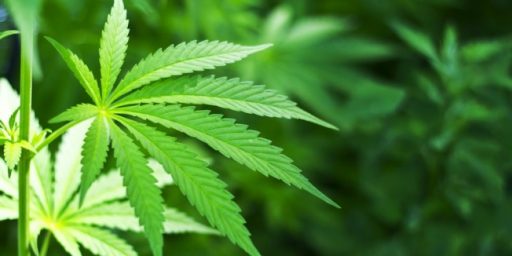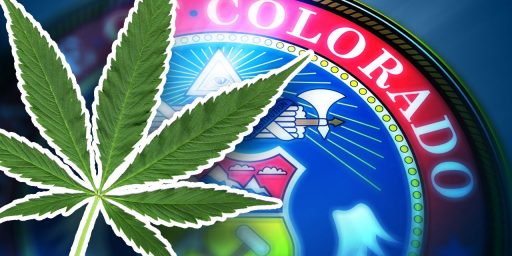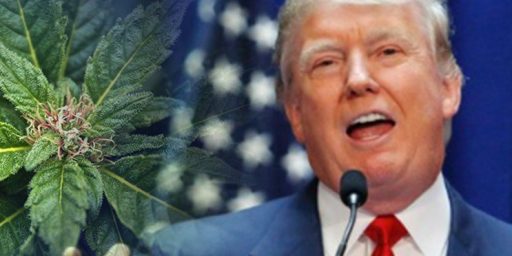Medical Marijuana Advocate Kills Herself
A 50-year-old woman committed suicide after 25 years of living with the pain of an autoimmune disease.
Robin Prosser, a Missoula woman who struggled for a quarter century to live with the pain of an immunosuppressive disorder, tried years ago to kill herself. Last week, she tried again. This time, she succeeded.
After her earlier attempt failed, Prosser wound up in even more trouble after investigating police found marijuana in her home. She used the marijuana to help cope with pain.
That marijuana charge was eventually dropped in an agreement with the city of Missoula, and Prosser had reason to rejoice in 2004 when Montanans passed a law allowing medical use of the drug. She was a high-profile campaigner for the Montana Medical Marijuana Act, and like others, she was dismayed when the U.S. Supreme Court ruled that drug agents could still arrest sick people using marijuana, even in states that legalized its use.
The ruling came to haunt Prosser in late March, when DEA agents seized less than a half ounce of marijuana sent to her by her registered caregiver in Flathead County. At the time, the DEA special agent in charge of the Rocky Mountain Field Division said federal agents were “protecting people from their own state laws” by seizing such shipments.
“I feel immensely let down,” Prosser would write a few months later, in a guest opinion for the Billings Gazette published July 28. “I have no safety, no protection, no help just to survive in a little less pain. I can’t even get a job due to my medical marijuana use – can’t pass a drug test.”
Federal prosecutors declined to charge Prosser, but fear spread through the system of marijuana distribution set up in the wake of the medical marijuana act. Friends said Prosser turned to other sources for marijuana, but found problems nearly everywhere she turned. “Most recently, she had found some people who said they could get her what she needed, but it didn’t go well,” said her friend Jane Byard.
Without the relief that marijuana delivered to her, Robin Prosser killed herself at home last week. She was 50.
Prosser suffered from an autoimmune disease that gave her allergic and dangerous reactions to most pharmaceutical painkillers. So she turned to marijuana. When that was no longer available she had no where else to turn. “She just said she couldn’t take it all anymore,” Byard said.
In her guest opinion, Prosser wrote that: “I’m 50 years old, low-income and sick. I spend most days in my apartment in bed, with no air conditioning, unable to go outside because I can’t tolerate the sun.” Beset by financial problems, troubled by depression, unable to find a reliable source of pain relief, she took her own life three months after the piece was published.
“Give me liberty or give me death,” she wrote in July. “Maybe the next campaign ought to be for assisted-suicide laws in our state. If they will not allow me to live in peace, and a little less pain, would they help me to die, humanely?”
Before being disabled by her disease, Prosser was a concert pianist and a systems analyst. After the disease hit her, she became a tireless advocate for legalized use of marijuana in medical situations.
Let’s be clear here: Despite the sensationalism of this slanted story (“Without the relief that marijuana delivered to her, Robin Prosser killed herself”) Prosser did not kill herself because the government wouldn’t let her have marijuana; she did so because her disease robbed her of her livelihood and had her in indescribable pain for the last quarter century. We know this because she was using marijuana to relieve the pain at the time of her first suicide attempt (the police found it in her home, remember) and she was still using the drug at late as July (she couldn’t pass a drug test, despite THC being undetectable in urine a month or less after use). So, please, spare me the hysterics.
That said, it’s absolutely unconscionable that it’s against the law for people like Prosser to seek what relief they can from marijuana.
It’s true, as Tbogg notes, that people can quietly get enough marijuana for personal use without much difficulty, whether for medicinal use or otherwise. Indeed, Prosser was rather clearly doing just that. But why should people have to flout the law in order to treat their pain?
Incidentally, as Susie Madrak explains, it’s not just illegal drugs:
What is this insanity? I mean, what purpose is served by this? And it’s not just pot. When I was a medical fraud investigator, insurance companies were forever sending us to investigate pain specialists and make sure they weren’t “overtreating.”
After an hour sitting in one of these waiting rooms, listening to people’s stories about all the hoops they and their doctor had to jump through in order to get pain treatment, I had to ask yourself: What is the gain here?
The policy makes the likes of Rush Limbaugh become a criminal. A man with permanent and excruciating back pain gets “addicted” to Oxycontin, a perfectly legal drug he’s prescribed by his doctor, and is faced with the choice of breaking the law or enduring the pain. Some choice.
Although I disagree with them in some particulars, Andrew Sullivan and John Cole [strong language alert] are right to note the absurdity of small government, state’s rights conservatives fighting so hard to overturn state medical marijuana laws. Whatever one’s views on the merits of our war on drugs, generally, one would think this particular battle would be one not worth fighting.
While I don’t buy it, I at least understand the “gateway drug” argument against allowing teenagers to smoke pot, let alone adults to sell it to them. Even though I think, for a variety of reasons, that we should fight against drug abuse via education and treatment rather than criminalization, I support the goal of a sober, functional citizenry. But, aside from the probability that some number of people will find a way to abuse medical marijuana laws to get the drug for recreational use, it’s hard to make a case for denying 50-year-old chemotherapy patients a means of alleviating pain.
via Memeorandum






Of course it’s more than the pot. It’s that once you become chronically ill or are otherwise permanently damaged in this country, you’re a third-class citizen.
With a pre-existing condition, you can’t afford health insurance without beggaring yourself (although often you’re not quite poor enough to get Medicaid), you’re not eligible for disability because occasionally you have a few good days, either you can’t afford the many drugs with which they want to treat you or they don’t work (or they do work, but the side effects are too overwhelming to allow you to function – in which case, they want to prescribe MORE expensive drugs to handle the side effects)…
And in the middle of all this, you’re wondering how to pay the rent, buy food. How do you have a life under these circumstances? How do you keep your dignity in a society that values self-sufficiency above everything else, that treats financial disaster as a character issue?
I’m watching a friend struggle with this now. She was in a bad car accident ten years ago and with the permanent brain damage, she can barely get out of bed most days – too nauseated from constant vertigo. On a good day, I can’t even take her out to eat – if there’s an overhead ceiling fan, the light deflection triggers a seizure. If there’s too much noise, it hurts her head.
According to Social Security, she’s able to go back to work. How many bosses can plan around an employee that may be functional one out of ten days?
Her husband divorced her after the accident. If her father hadn’t died and left her some money, she’d be living in a cardboard box. As it is, her trust is now worth one-third of what it was a year ago and they tell her it will run out in five years. What does she do then?
Re: gateways: there’s nothing magical about pot that leads to other drugs. If it does, it’s because the same guy you get pot from occasionally has coke or whatever. It’s purely a structural feature of illegality.
And yet during this time of chronic back pain he chose to take up the sport of golf.
Sorry James, but it’s the truth.
I have no problems with legalization provided any employer-private or government is allowed to discriminate with regards to employment regarding whether they want users on their payroll.
Personally I would prefer that my child’s bus driver be required to pass drug tests and remain sober.
I want my child’s teachers to be clear headed and sober while in charge of my children.
I want pilots and other public transportation providers to be clean and sober.
If I run a factory I want to be sure the people operating the machinery in that factory are sober and alert.
I do get twitchy over the legalization of some drugs-I don’t see any good reason to promote or encourage use of drugs such as meth, although I wonder if the market for these drugs would mostly evaporate if other, less dangerous drugs were made legal or at least their possession/use was decriminalized.
Other than when pot is used, I don’t see it as being all that dangerous a drug compared to some that are already legal (alcohol and cigarrettes).
I think the above is a pretty level headed. No one wants to fly with a drunk pilot.
However, one thing we should always keep in mind is that the largest abuse problem of any drug, by workers and other regular and respectable folks, is by far legal alcohol.
Quite right. And, outside of perhaps the extreme fringes of NORML, nobody I know of is arguing that it ought be legal to drive, fly, teach, or various other things while stoned any more than we now allow them to do those thinks drunk.
And, outside of perhaps the extreme fringes of NORML, nobody I know of is arguing that it ought be legal to drive, fly, teach, or various other things while stoned any more than we now allow them to do those thinks drunk.
But see we have a legal definition that is measurable of impairment.
I am not sure we can easily measure impairment with other drugs (unless measurement has come a long way).
I think the question-is how do you measure impairment with say a bus driver or teacher if they are stoned or have been snorting cocain? If you can’t measure impairment for that moment in time-then can/should employers be permitted to require their employes not use them at all, and monitor through testing? I think you can easily make the argument for a private industry, but what about government jobs-like teachers, air traffic controllers, police officers etc?
How many people are driving right now, high on legaly obtained prescription drugs? Many.
How many people are driving right now, high on legaly obtained prescription drugs? Many.
But that really isn’t what my point is.
I don’t think legalization of drugs is going to make people all the suddent stop doing things impaired-because they already do, my question is will employers be allowed to discrimate without threat of lawsuit if they choose to not hire or fire people because they are using drugs, even if they aren’t neccessarily doing so at work.
I live across the street from a pot head, I wouldn’t put him in charge a goldfish, I would hate to see him get a job as a bus driver (which he could-he has a clean driving record and a clean criminal record-he just hasn’t been caught doing anything while high)-can they refuse to hire him, or fire him if he pops a positive on a drug test, or will/should the fact that the drugs are legal and he can use them legally mean they can’t fire him if he uses?
This is where my area of concern is. If you want to fry your brain on drugs-go for it, but I don’t want to foot the bill for your addictions, and I sure as heck don’t want you in any kind of position where you would be responsible for my safety or that of my family.
James, I pretty much agree with your post and have no perfect answer either for the damned if you do, damned if you don’t hand we are holding with the drug issue. But I can’t help but note given your quote above that the “small government, state’s rights” mantra held in prior decades by a majority of the people now running the GOP weren’t their actual guiding principles, they were only their talking points from an era when they didn’t control the federal government. Now that they at least sometimes do, we get federal attempts to ban gay marriage, abortion or affirmative action, No Child Left Behind, massive deficits, prescription Medicare plan, and on and on and on. There do appear to be some true believers in small government (maybe Flake and Paul), but unfortunately most people calling for small government change their mind when they get the wheel.
This comment thread seems to be coming around to some of the practical complications in legalizing a wide range of pharmaceuticals. How would advocates feel about significantly more invasive tests of impairment than breathalyzer tests?
I’m not opposed to the legalization of marijuana, particularly if some form of reliable and non-invasive testing of impairment applicable to motor vehicle usage has or can be put into place.
Would your concern be substantially different if he was a drunk rather than a pot head?
A video camera and a field sobriety test should be sufficient.
Would your concern be substantially different if he was a drunk rather than a pot head?
Nope but then there are easy ways to measure impairment-and several of these are non subjective ways (breathalizer and blood tests with a legally defined limit for what constitutes impairment).
My problem is that I think saying “if you choose to use these drugs at all, we won’t be hiring you” can and should be a legitimate reason to hire or fire people. I am not so sure, with legalization this would be allowed to be the case-especially for jobs where the government employs people-but many government jobs involve major safety issues or major responsibility.
I am not convinced a field sobriety test is the most subjective way to measure impairment while under the influence. For one thing, some drugs may not impair reflexes but may impair judgement-just because my child’s teacher can still touch her finger on her nose, that doesn’t necessarily mean she doesn’t have her judgement impaired.
Some drugs cause irratic behaviors in people-not exactly the kind of person I want in charge of my children.
My point is that there are some real issues that come with legalization-just because drugs are legal, that doesn’t mean society will turn into perfect utopia where nobody does dangerous or dumb things, and at the very least I think employers should be able to decide just what kinds of risks they want to take with who they hire and I think drug use alone should be a reason to fire-because unlike with alcohol, there to date isn’t a easy and objective way to measure immediate use or immediate impairment.
Field sobriety tests aren’t scientific in the sense that you seem to be suggesting, Grewgills, and in many jurisdictions are not accepted as proof of DWI.
Why?
They were sufficient evidence for alcohol impairment prior to the acceptance of breathalyzer evidence in courts. It does seem though that it should be possible to devise a test to determine if marijuana has been recently smoked.
BTW – studies both recent and very old ( I saw the first as a limited distribution xeroxed book in a library almost 30 years ago ) point to Nicotine as THE gateway drug to teen alcohol abuse, marijuana use, and to hard drugs.
Gateway drug? How many people do you know who, as kids, smoked pot *before* trying cigarettes, and raiding their parents’ liquor cabinet? I don’t know any. Alcohol and tobacco are the true “gateway drugs,” and the biggest part of their attraction to me, as a kid, was the fact that they were illegal to me, a minor.
So none are you suggesting that if MJ or other illegal drugs are legalized that they should be legalized for minors?
Why?
Because companies shouldn’t be required to hire and accept the risk of having impaired employees on the job.
If a bus driver is MJ impaired it isn’t the driver who is going to get sued it is the school district that hired him.
If a teacher is impaired and a child is injured or harmed, the district gets sued not the teacher.
If a factory has repeated accidents their insurance goes up, they may be fined by various agencies etc.
I think employers should be able to say thanks but no thanks. Currently they can easily do so on the basis that the substances are illegal, but if legalized they may have to put potentially impaired employees on the job.
Field sobriety tests are not reliable.
You don’t think having to deal with the legal system like a common criminal {piss tests, court supervision} didn’t take a toll on someone barely hanging on with a chronic disease as it was.
If you mean the breath alcohol content, then no we don’t have a reliable definition. We have voodoo science,
But we do have common law ways to measure impairment, steady gait, speech, eye brightness and other SFST that can tell us if a person who has used Marijuana is impaired. In fact most states use exactly these clues to determine whether to further test these individuals for ability to work machinery like a car.
Meanwhile, the Governator shows again that stating the obvious and going to the center may be the way to the future.
Report: Gov. Arnold Schwarzenegger Says Marijuana Not a Drug
My view is, well duh. I use alcohol, and brew beer, which in 1930 would make me a criminal. I know that the end of Prohibition helped bring America out of the Depression. I do not use MJ, but I know folks that do, and I don’t think any of them are committing violent crimes. On the other hand, if the drug was meth, from what little I’ve seen about meth (and personal experiences with theft), I’d be very much against it.
I just saw this as a headline looking at another article off Drudge, not that I don’t go to Fox, just as I go to the other media.
Most who advocate legalization think there should be age restrictions like those for cigarettes and alcohol. The irony of our current system is that in many places it is easier for minors to get marijuana and other illicit drugs than it is for them to get alcohol.
Why do you think a casual marijuana smoker is more likely to use on the job than a casual drinker?
Should employers be allowed to fire employees for drinking alcohol? All of the problems you listed are more severe for alcohol when compared to similar use of marijuana*. There is far more loss of productivity due to alcohol than due to marijuana particularly when day after effects are included in the calculation.
If alcohol, marijuana, depression, or anything else is interfering with ones performance on the job that should be addressed. Whether that is addressed by treatment or termination should be up to the employer or employer and employee together.
That depends on your definition of drug. By most reasonable definitions marijuana is, or at least contains, a drug(s). THC and the various other active cannabinoids certainly chemically “affect the structure or function of the body.” Then again so do many things that people use on a daily basis. I know a great many people who are seemingly unable to start their day without a caffeine fix.
* By similar use I mean achieving a similar level of high for a similar length of time.
Why do you think a casual marijuana smoker is more likely to use on the job than a casual drinker?
Should employers be allowed to fire employees for drinking alcohol?
The difference between alcohol and MJ is that alcohol leaves the system quickly, MJ and other drugs (depending on just how far you support taking legalization) do not.
Also, alcohol impairment is easy to measure. Drug impairment not neccessarily so easy.
All of the problems you listed are more severe for alcohol when compared to similar use of marijuana*. There is far more loss of productivity due to alcohol than due to marijuana particularly when day after effects are included in the calculation.
Where is this stat coming from? Got a link to this study?
Do you think it would remain the same, if MJ was legalized? Or do you think you would see an increase in use?
The reality is that drug use of any kind can lead to problems on the job. Broadly legalizing drugs will likely see that increase. I don’t think employers should be required to hire or keep employees that use drugs. They are the ones who get sued, when things go wrong, they are the ones who experience loss, when things go wrong.
Marijuana has no measurable effects within a few hours after use. Nicotine also remains in the system for nearly a week after use though also not with any measurable impairment.
No, just personal experience. I know the effects and after effects of both. I am not aware of studies on the relative effects, but alcohol is used by far more people and that is not likely to change. Add to this, the after effects of alcohol are far more severe** and I am reasonable certain of my assertion. Do you have any evidence to the contrary?
There might be a slight increase in use, but I doubt that there would be much long term effect on usage. Where I live marijuana (weed and hash) are legal as are (for the moment) mushrooms and usage by the local population is not appreciably higher than where I have lived in the US*. I have not seen anyone working stoned though some have come back to the lab after a couple of beers.
True, and if they do the employer has recourse whether or not the drug is legal.
Perhaps, perhaps not. I doubt the effect would be measurable.
If it interferes with their work there should be consequences regardless of the legality of the drug. If it does not interfere with their work why should they be penalized?
* The tourists, particularly British and Americans, use considerably more.
** Interact with anyone the day after getting falling down drunk, and someone the day after getting too stoned to leave the sofa and the differences will be obvious to you. Typically both will be lethargic, but one will also be dehydrated, nauseous, achy and unable to be at all productive, the other will simply require a little extra motivation. During my college days I knew many people who woke up drunk the next day, I have yet to meet someone who woke up stoned.
If the usage of either was mild to moderate there will not likely be any detectable effect of either the next day unless the alcohol was cheap.
I would probably have to agree, if it was clear that marijuana was the only substance capable of bringing a sufficient level of relief. The fact the woman killed herself while using marijuana calls into question its effectiveness, doesn’t it? And can we really rule out the possibility that some other form of pain relief might have been equally or more effective?
I have heard the opinion expressed by persons more knowledgeable about medicine than myself that American doctors are not as competent as they should be at pain relief. This is a problem, but it’s unclear to me that marijuana is the answer.